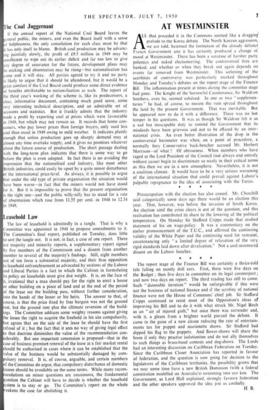easehold Law
The law of leasehold is admittedly in a tangle. That is why a ommittee was appointed in 1948 to propose amendments to it. he Committee's final report, published on Tuesday, does little o sort the tangle out. It is not, in fact, a case of one report. There re majority and minority reports, a supplementary report signed y five members of the Commission and a dissent from another ember to several of the majority's findings. Still, eight members ut of ten form a substantial majority, and their firm opposition
o leasehold enfranchisement as advocated by sections of the Labour nd Liberal Parties is a fact to which the Cabinet in formulating ts policy on leaseholds must give due weight. It is, on the face of t, irrational that a man should pay for the right to erect a house r other building on a piece of land and at the end of the period if the lease see the building pass, without further consideration, nto the hands of the lessor or his heirs. The answer to that, of ourse, is that the price fixed by free bargain was not the ground ent, but the ground rent plus the ultimate reversion of the build- ngs. The Committee adduces some weighty reasons against giving he lessee the right to acquire the freehold in his site compulsorily, ut agrees that on the sale of the lease he should have the first efusal of it ; but the fact that it sees no way of giving legal effect
o that doctrine diminishes the value of the recommendation con- iderably. But one important concession is proposed—that in the ase of business premises renewal of the lease at a fair market rental hould be authorised in cases where it can be established that the alue of the business would be substantially damaged by com- ulsory removal. It is, of course, arguable, and certain members f the Committee do argue, that compulsory disturbance of domestic essees should be avoidable on the same terms. While many recom- endations on minor questions are unanimous, the fundamental uestion the Cabinet will have to decide is whether the leasehold ystem is to stay or go. The Committee's report on the whole eakens the case for abolishing it.






































 Previous page
Previous page